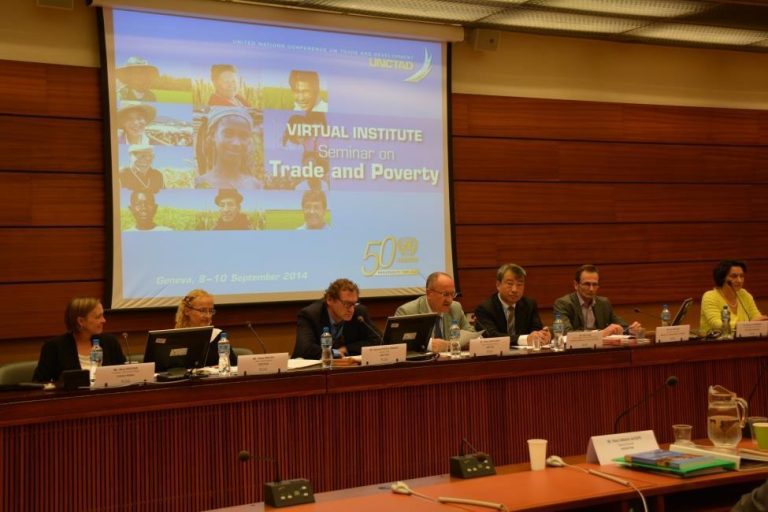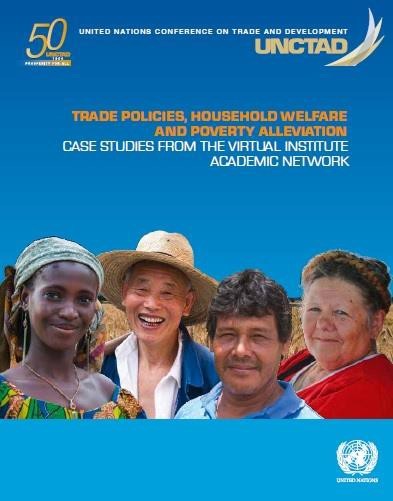UNCTAD Virtual Institute: Strengthening the capacity of developing country academics (UNCTAD)
 UNCTAD has supported the strengthening of the capacity of developing country academics to conduct policy-oriented teaching and research on trade and development issues through Development Account projects implemented by its Virtual Institute (Vi). By developing original teaching materials and adapting them to local contexts in individual countries, these projects have resulted in an increase in the quantity and the enhancement of the quality of postgraduate teaching and relevant research at participating universities. They have also helped enhance the role of academic institutions in fostering evidence-based policymaking on topics such as trade and poverty in developing and transition countries. The projects have, furthermore, contributed to increased researcher-policymaker cooperation and ensured that the research outputs completed are policy relevant for the participating countries. Since the completion of the projects, the Vi has grown to 134 academic institution members in 64 countries, whose staff have so far used the materials on the Vi website to train more than 33,000 students.
UNCTAD has supported the strengthening of the capacity of developing country academics to conduct policy-oriented teaching and research on trade and development issues through Development Account projects implemented by its Virtual Institute (Vi). By developing original teaching materials and adapting them to local contexts in individual countries, these projects have resulted in an increase in the quantity and the enhancement of the quality of postgraduate teaching and relevant research at participating universities. They have also helped enhance the role of academic institutions in fostering evidence-based policymaking on topics such as trade and poverty in developing and transition countries. The projects have, furthermore, contributed to increased researcher-policymaker cooperation and ensured that the research outputs completed are policy relevant for the participating countries. Since the completion of the projects, the Vi has grown to 134 academic institution members in 64 countries, whose staff have so far used the materials on the Vi website to train more than 33,000 students.
Academic institutions can play an important role in fostering evidence-based policymaking. They educate future generations of policymakers and provide research and analysis to serve as inputs for government policies. The Development Account has supported two projects of the UNCTAD Virtual Institute (Vi) which have helped strengthen the teaching and research capacity of academic institutions in developing and transition countries. With the support of the Account, the number of academic institutions that are members of the Vi has grown to 134 institutions from 64 countries around the world.
The first Development Account-funded project, Strengthening national capacities for home-grown economic policies through a network of the UNCTAD Virtual Institute, implemented between 2006 and 2009, aimed at strengthening teaching and research capacities on trade and development issues and supporting academic networking and cooperation among developing and transition country universities. The second project, Strengthening capacities for policy-oriented analysis of key global development challenges at developing country universities, implemented between 2012 and 2014, provided sophisticated postgraduate economics training, combining an online course, face-to-face training and online mentoring, to researchers from developing and transition countries, and generated high-level original research on the impact of trade on poverty.
Strengthened capacity for teaching, research, policy analysis and cooperation between academics and policymakers
The first project has resulted in an increase in the quantity and an enhancement of the quality of relevant postgraduate teaching and research at participating universities. Local research capacity has been enhanced through local adaptations of teaching materials and joint research projects. Thanks to the project, beneficiary universities now have increased access to relevant teaching resources and knowledge sharing through the Vi website, and 1,356 staff from beneficiary universities and research institutes have used the Vi website to access teaching resources and for knowledge sharing.
The second project has resulted in the strengthening of developing and transition country researchers’ capacities to undertake policy-relevant research on the impact of trade on poverty in their countries. Participating countries now have pools of trade and poverty researchers available to provide analysis to their governments. The project has further contributed to increased researcher-policymaker cooperation as each research project was conducted jointly by researchers and policymakers. Building on the experience from the project, participating researchers and policymakers are now more familiar with their respective needs and constraints and are better equipped for similar collaborative projects in the future. These collaborations promoted by the Vi have made the research outputs completed under the project policy-relevant for the participating countries.
 The results and impact of the projects are summarized below:
The results and impact of the projects are summarized below:
- More than half of the respondents to the questionnaire circulated to the participants of the first project used the new materials for course preparation or as background reading in teaching nearly 15,500 students by the end of the project.
- The global geographical coverage of the Vi made possible research projects between universities from different continents. For some researchers, the modest funding provided by the Vi was their only source of funds for research. Such projects and collaborations would not have happened without the Vi.
- Localized teaching materials and papers were published and presented to policymakers, strengthening policy- relevant local research capacity. More than 100 researchers, including 38 women, from 56 developing and transition countries acquired new skills on trade and poverty research methods.
- Eleven policy-relevant trade and poverty studies were written by participating researchers in cooperation with national policymakers. Findings were shared with the policymaking and academic community and interested stakeholders.
- The trade and poverty skills from the project were used in research and teaching in developing and transition countries.
The knowledge acquired and generated through the project will continue to be passed on to university students, staff and policymakers through university courses, workshops and short courses. This will ensure multiplier effects and sustainability of the project outcomes. The focus on the development of local capacity as opposed to relying on outside expertise, as well as the long-term commitment to mutual support and cooperation between all partners, have further enhanced the sustainability of project outcomes.
“The Vi helped our university launch the country’s first master’s degree programme in International Economics and Trade Policy in English, providing professional development for our staff, teaching materials and advice on the courses and topics to be included. Vi networking further strengthened the programme by facilitating our association with the Vi German member, HTW Berlin, which sponsored eminent visiting professors and granted fellowships for our teachers to pursue their studies at HTW and upgrade their teaching skills there.” – Stakeholder from Belarus State Economic University, Belarus
“I feel that the Virtual Institute represents a model for capacity building which is unparalleled. It is not only a mechanism, it’s not only a channel, but it is a forum where people get together and learn. I think the Virtual Institute is the United Nations at its best.” – Gender Equality Ambassador, Ministry of Foreign Affairs, Norway
“Vi has proven to be very useful and instrumental in connecting UNCTAD research and analysis with sustainable capacity-building activities.” – UN Joint Inspection Unit, 2012 Review of management and administration in UNCTAD
Read more about the work of UNCTAD in this area:
- http://vi.unctad.org (Vi website)
- http://vi.unctad.org/about/watch-our-video (Vi documentary video)
- http://vi.unctad.org/about (Vi information brochure in English, French and Spanish)